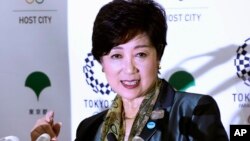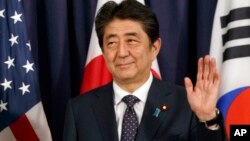A fledgling conservative party led by popular Tokyo Governor Yuriko Koike is gaining traction in its challenge to Japanese Prime Minister Shinzo Abe’s ruling bloc ahead of a general election next month, media polls released Thursday showed.
Abe, a conservative who returned to power in 2012, is calling the snap lower house poll hoping his Liberal Democratic Party-led (LDP) coalition can maintain a simple majority. It currently holds a two-thirds “super” majority.
Abe on Thursday dissolved the lower house of parliament and called a snap election for next month as expected.
The speaker of the house, Tadamori Oshima, read a statement of dissolution, ordered by Abe. The election is expected to be held Oct. 22.
Party of Hope upends Abe outlook
The LDP-led bloc began with a strong lead, but Koike’s new party — formally launched Wednesday — has upended the outlook after she announced she would lead the group herself.
Koike, a media-savvy former LDP lawmaker and defense minister often floated as a candidate to become Japan’s first female prime minister, said Wednesday she would not run for a lower house seat herself, but speculation that she will persists.
A survey by the Mainichi newspaper showed 18 percent of voters plan to vote for Koike’s Party of Hope compared with 29 percent for Abe’s ruling Liberal Democratic Party (LDP).
An Asahi newspaper poll showed 13 percent planned to vote for Koike’s party versus 32 percent for the LDP. Both surveys asked voters their preference for proportional representation districts where ballots are cast for parties rather than specific candidates.
Abe’s decision to call a snap election has been bolstered by an improvement in his personal ratings, which have risen to around 50 percent from around 30 percent in July.
Another party may be edged out
The emergence of Koike’s party, which she describes as pro-reform and conservative, has thrown the main opposition Democratic Party into turmoil. The Democrats are struggling with defections and single-digit ratings and now appear in danger of being absorbed by the Party of Hope.
Democratic Party leader Seiji Maehara will propose that the party run no candidates in the election and let its members run under the Party of Hope flag, domestic media reports said.
The proposal could end up splitting the party, an often fractious mix of conservatives and liberals whose rocky 2009-2012 reign tainted its image with many voters.
Koike, 65, defied the LDP to run successfully for Tokyo governor last year and her novice local party then crushed the LDP in a metropolitan assembly election in July.
Differences with LDP
Her Party of Hope shares policy space with the business-friendly LDP, but Koike has staked out different stances on two issues likely to appeal to voters.
She wants to freeze a planned rise in the national sales tax to 10 percent from 8 percent in 2019. Abe says he will raise the tax but spend more revenue on child care and education instead of paying back public debt.
Koike is also calling for Japan to abandon nuclear power, while Abe’s government plans to keep atomic power as a key part of the energy mix despite public worries about safety after the 2011 Fukushima nuclear crisis.
Koike has also criticized Abe for risking a political vacuum by calling the snap poll at a time of rising regional tensions over North Korea’s nuclear and missile programs.
Recent reforms will reduce the number of lower house seats to 465 from 475 in the coming election.






